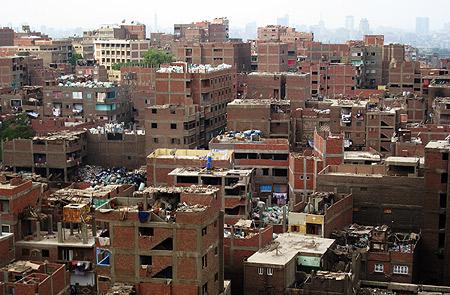Historically, the so-called 'garbage people' have been able to manage Cairo's total waste production, but as a result of the city's explosive population growth, which has placed pressure on the old system, city authorities have outsourced part of the waste collection and management work to a number of foreign companies, including the Italian firm, Ama Arab, in order to avoid an environmental catastrophe.
"...it seems relevant to tell a story about how, in many ways, everyday life in Egypt is very much like ours..."
Mikala Krogh had already considered making a film on one of Cairo's garbage cities before Cities on Speed was announced.
"When my project was selected, one prerequisite was that my original presentation had to be expanded upon to include a broader perspective, so that it was not solely about the garbage people, but more about how renovation was handled in Cairo – which includes the political level, city planning and so on. So that was the assignment I had when I travelled to Cairo."
How did the specific requirements affect your usual way of working?
"First and foremost, it meant that I had to try to combine my more observational method with a more journalistic element, which was an interesting challenge. As a whole, I was quite convinced that the film had to be able to work on television and would have to be directed to a wider public beyond those who were already interested in the environment or documentaries. So I hope that the combination of my observational film language and some journalistic elements can shed light on the topic in such a way that people in the rest of the world can identify with the problems that people are struggling with in Cairo."
What is it that separates your film from a journalistic television production?
"Specifically, it must have something to do with the time dimension: the fact that I was present for a period of four to five months and followed my characters in a way that allows for some sort of development to take place. In a typical TV piece, a journalist goes in and interviews the people about what happened. In my film, we can follow along and see how attitudes and routines slowly change. And it may also have something to do with the visual language. Visually, I have consciously worked with either total images or very close cuts to communicate the relationships between the big city and the different challenges faced by individuals."
What were your greatest challenges?
"First and foremost, Cairo is a very demanding place to film because it is difficult to obtain the necessary permits. And once you’ve got them, you are still under surveillance and must be careful of what you do. It was also a personal challenge for me to work with a local photographer, because in all of my other films I've worked with the same two photographers, with whom I share a common cinematographic language. But it turned out to be a huge gift, because the photographer I ended up working with understood the language and knew Cairo extremely well."
– The film’s narrative motor is garbage, but what do you see as the overall theme?
"It's about changing our habits, and about being able to adapt as cities develop. And that is a universal narrative. Indirectly, of course, it is also about consumption, but again, it was not my intention to go in, point fingers and ask critical questions concerning whether or not people consume too much in Egypt or whether they could do things differently. I am more interested in pointing out areas where we resemble one another across national and cultural boundaries. And I believe that everyone is familiar with the difficulties involved in adapting – whether it involves carrying your garbage down to the street and leaving it in a container, taking shorter showers or leaving your car at home. It's a challenge for all of us.
"In this way I wished to paint another picture of the Middle East than the one we normally see. In the West, most stories about that part of the world either take pity on the Muslims, or in the case of fundamentalists, gladly portray women with headscarves as oppressed. For this reason, it seems relevant to tell a story about how, in many ways, everyday life in Egypt is very much like ours; also, in this case, women have actually taken the initiative to go out and actively try to solve the problems at hand."

